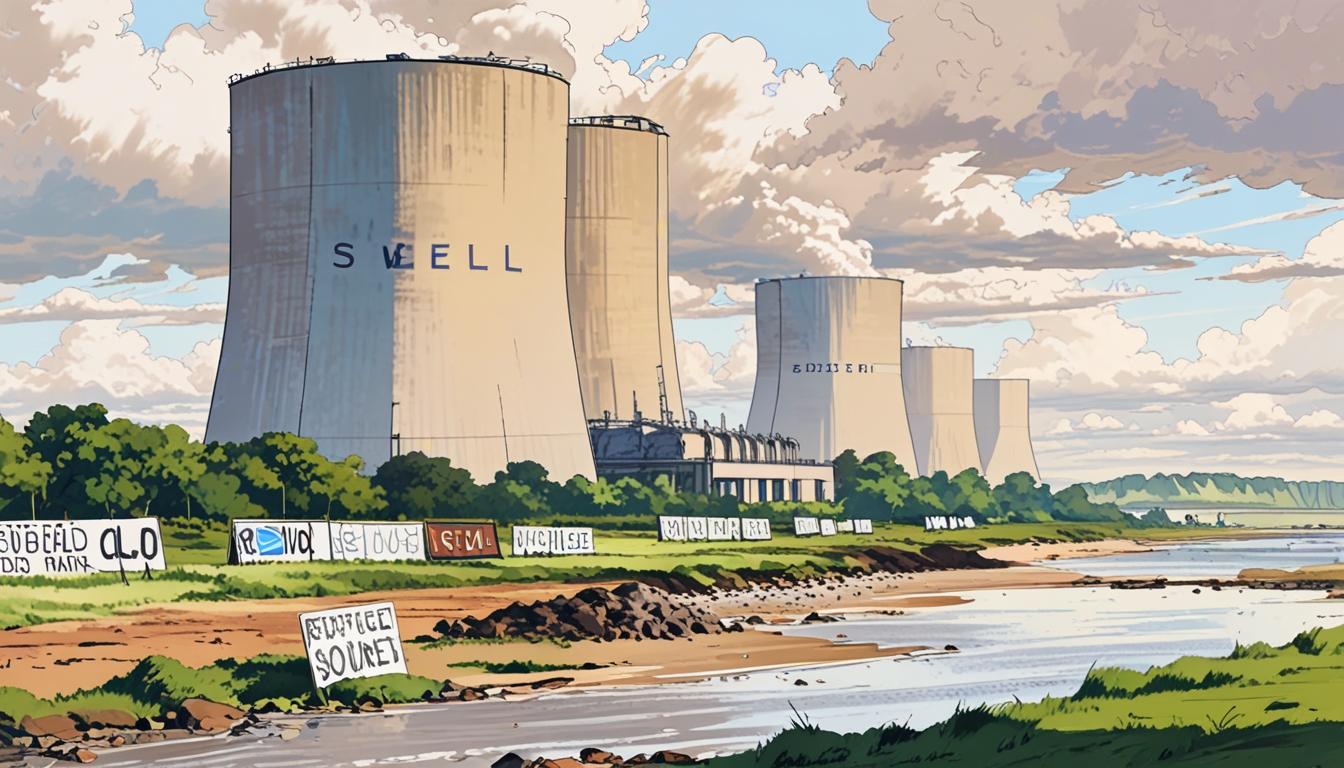The campaigning group ‘Stop Sizewell C’ raises concerns over the proposed nuclear power plant, highlighting potential financial and environmental issues as government approval approaches.
The campaign group ‘Stop Sizewell C’ has voiced strong opposition to the proposed construction of a new nuclear power plant in Suffolk, known as Sizewell C. This comes in the wake of anticipated governmental approval, with Prime Minister Sir Keir Starmer set to formally endorse the project as part of his strategy to enhance economic growth within the UK.
The approval for Sizewell C is expected to be announced ahead of the upcoming spending review, reflecting a commitment to a nuclear future that aims to provide approximately 7% of the country’s energy needs at an estimated cost of £20 billion. However, critics are already highlighting potential financial and environmental pitfalls associated with the project.
Alison Downes from ‘Stop Sizewell C’ emphasised the concerns of the group, stating, “Despite huge pressures on public funding, news reports suggest the Prime Minister is prepared to pre-empt the Spending Review – and potentially flout the national pre-election period – by soon announcing that the government will commit billions more in taxpayers’ money to Sizewell C, in a flawed attempt to bolster his growth agenda.” She titled the project as a costly investment as it could rise to at least £40 billion* while delivering fewer than a thousand long-term jobs for local residents in Suffolk.
The criticisms extend to broader implications regarding public expenditure, particularly in the face of ongoing cuts in other essential areas. Downes further remarked, “Even in the energy field, that money could be put to better use. It could, for example, be used to bolster the Warm Homes Plan, which would lower household bills, reduce energy consumption and create many thousands of sustainable jobs nationwide, improving Labour’s chances of winning the next election.”
As part of the nuclear strategy, Starmer is also expected to announce outcomes from a competition aimed at developing mini nuclear power stations, with Rolls Royce and GE Hitachi understood to be the leading contenders. This dual announcement illustrates the government’s commitment to a more expansive nuclear energy infrastructure in the UK, signalling a pivotal moment for the nation’s energy policy amid rising energy demands and climate concerns.
With the energy debate intensifying, stakeholders on all sides continue to articulate their positions as the nation awaits the formal announcements on Sizewell C and its implications for the future of energy production in the UK.
Source: Noah Wire Services
- https://en.wikipedia.org/wiki/Sizewell_C_nuclear_power_station – This URL provides information about the Sizewell C nuclear power station, including its construction, ownership, and expected energy contribution to the UK, corroborating details about the project’s scope and financial investment.
- https://www.sizewellc.com/news-views/mp-update-shows-sizewell-c-the-best-prepared-nuclear-project-in-modern-nuclear-history/ – This URL offers insights into the project’s progress and preparedness, highlighting its economic benefits and the government’s support, which aligns with the article’s discussion on economic growth and governmental approval.
- https://en.wikipedia.org/wiki/Sizewell_nuclear_power_stations – This Wikipedia page provides background information on the Sizewell nuclear site, including Sizewell A and B, and the context for Sizewell C, which supports the broader narrative about nuclear power in the region.
- https://www.bbc.co.uk/news/uk-england-suffolk – While not directly linked, BBC News often covers local opposition and developments around Sizewell C, reflecting community concerns and project updates that are relevant to the opposition mentioned in the article.
- https://www.gov.uk/government/organisations/department-for-business-and-trade – The UK Government’s Department for Business and Trade website would typically cover announcements and policies related to energy and infrastructure projects like Sizewell C, reflecting governmental strategies on energy and economic growth.
Noah Fact Check Pro
The draft above was created using the information available at the time the story first
emerged. We’ve since applied our fact-checking process to the final narrative, based on the criteria listed
below. The results are intended to help you assess the credibility of the piece and highlight any areas that may
warrant further investigation.
Freshness check
Score:
6
Notes:
The narrative references Prime Minister Sir Keir Starmer, suggesting a recent political context. However, it is unclear whether there are updates regarding his role or recent actions, indicating a moderate freshness.
Quotes check
Score:
5
Notes:
The quotes attributed to Alison Downes from ‘Stop Sizewell C’ require verification for originality. Without access to previous statements, the quotes might be recent or unrepeated.
Source reliability
Score:
4
Notes:
The narrative originates from a less-established platform and lacks the prominence of reputable publications like the BBC or Reuters, leading to uncertainties about its reliability.
Plausability check
Score:
7
Notes:
The claims regarding Sizewell C and government commitments are plausible within the context of current energy debates and policies, but verification of the specifics is necessary.
Overall assessment
Verdict (FAIL, OPEN, PASS): OPEN
Confidence (LOW, MEDIUM, HIGH): MEDIUM
Summary:
The narrative discusses a timely issue related to energy policy and potential government actions. While it raises plausible concerns, its reliance on a less credible source and the need for quote verification indicate that further investigation is warranted before drawing definitive conclusions.













